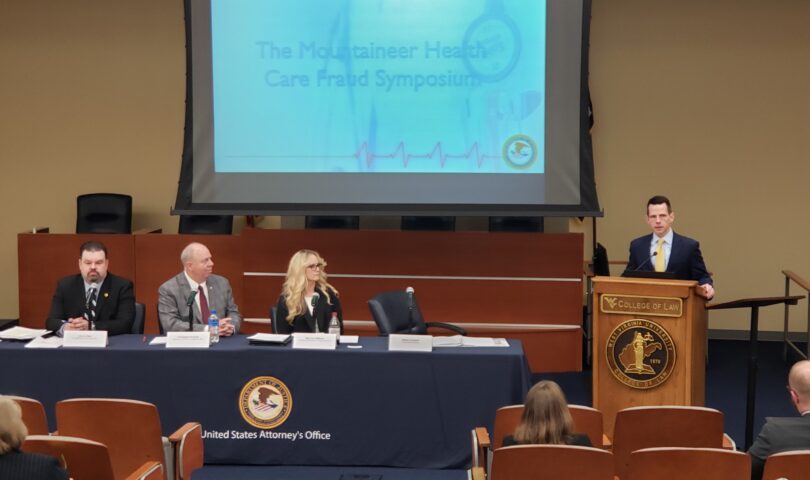TO REPORT health-care fraud: 800-HHS-TIPS (447-8477); tips.hhs.gov; TTY at 800-377-4950
MORGANTOWN – A panel of experts gathered at WVU’s law school Thursday morning to talk about how health care fraud harms everyone.
The gathering was timely, coming on the heels of a Wednesday announcement from the U.S. Department of Justice that it was leveling criminal charges against 21 defendants in nine federal districts for their alleged participation in COVID-related fraud schemes. Those schemes allegedly resulted in more than $149 million in COVID-19-related false billings and the seizure of more than $8 million in cash and other fraud proceeds.
The gathering was called the Mountaineer Health Care Fraud Symposium, hosted by William Ihlenfeld, U.S. attorney for the Northern District of West Virginia.
Various speakers said that health care fraud has been going on for years, and the fraudsters continually find new, more-complex ways to carry out their schemes.
Asked about the reason for holding the symposium at this particular moment, given the never-ending nature of the problem, Ihlenfeld said he returned to the federal post in October after several years in the private sector and state Senate.
“All of that just told me we need to do more with regard to health care fraud,” he said — to raise awareness for the legal community and for consumers. “The idea is to educate the public to what it is, how it occurs, how they can become a victim and how they can report it. The more of this we can do the more likely it is that people are going to tell us what they’re experiencing.”
Ihlenfeld said there’s more fraud occurring than what comes to the attention of his office. “We’re trying to get that information to us so we can do something about it.”
Among the schemes described in Wednesday’s announcement and mentioned at the symposium: owners of medical clinics in Maryland and New York allegedly obtained confidential information from patients seeking COVID-19 testing at drive-thru testing sites and then submitted fraudulent claims for fictional lengthy office visits. They laundered the proceeds through U.S. shell corporations, transferred it offshore and used it to buy real estate and luxury items.
The speakers — state and federal investigators and health insurance company investigators — said fraud comes in many forms: unnecessary prescriptions; upcoding, which is billing for more expensive services than actually provided; billing for services that never occurred; provider kickbacks for testing and prescriptions; fake vaccine cards; and more.
Mary Ann Withrow, with the Health and Human Services Office of Inspector General, called it “theft and deception.”
She cautioned people to be wary of telemarketers and offers advertised on social media. These fraudsters are often seeking your personal health information to bill your insurance provider for goods and services never provided.
Trina Crowder, special investigator for The Health Plan, echoed that, adding that people should also be wary of pop-up sites that have been prevalent during the pandemic.
She said the fraudsters can drain your benefits so you have no coverage available. It can also put false information in your medical chart, leading to incorrect and possibly harmful medical treatment.
Read your EOB — explanation of benefits — when they come in the mail, she said, to look for false charges or overcharges.
And Withrow said if you need a medical device, talk to your doctor and get it through the right channels. In some cases, she said, you may order something from a fraudster and actually get it — or get a lot of it, such as boxes of knee braces or adult diapers or diabetes supplies you don’t need, and a huge bill going to your insurance company.
The question was asked, who pays for it? Kurt Spear, Highmark investigator said, “Really, all of us.” Taxpayers pay through misspent Medicare and Medicaid money, and higher taxes; and consumers through increased insurance premiums.
John Blair, with the state Medicaid Fraud Control Unit, described another type of fraud that’s been seen across the country and is now moving into West Virginia. It’s called patient brokering. Bogus sober living homes lure in substance-abuse patients, get their information and use it to make money through bogus billing. Oftentimes, patients get tossed out on the street after their benefits are drained.
“I think it’s something we’re really going to have to keep an eye on,” he said.
TWEET David Beard @dbeardtdp
EMAIL dbeard@dominionpost.com




